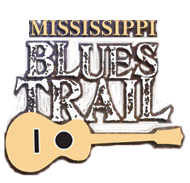Baptist Town
Baptist Town - Greenwood
Baptist Town, established in the 1800s in tandem with the growth of the local cotton industry, is one of Greenwood’s oldest African American neighborhoods. Known for its strong sense of community, it is anchored by the McKinney Chapel M.B. Church and a former cotton compress. In blues lore Baptist Town is best known through the reminiscences of David “Honeyboy” Edwards, who identified it as the final residence of Robert Johnson, who died just outside Greenwood in 1938.
Robert Johnson and Honeyboy Edwards were just two of the legendary blues singers who rambled in and out of Greenwood during the era when life revolved around cotton plantations, gins, compresses, and oil mills. African American workers settled in Baptist Town, Gritney, G.P. (Georgia Pacific) Town, Buckeye Quarters, and other neighborhoods, although the majority lived on outlying plantations. Blues and gospel music flourished, and when Greenwood’s venues closed for the night, revelers often headed to the outskirts of town or out to the plantations where the music could continue unimpeded on weekends. According to Edwards, Baptist Town was a safe haven for a musician who wanted to escape work in the cotton fields, and both he and Johnson found places to stay here in 1938 on Young Street, around the corner from this site. They performed locally at the Three Forks juke joint, along with Sonny Boy Williamson No. 2 (Rice Miller), who was a familiar figure around Greenwood for several decades. Johnson was allegedly poisoned at the juke by a jealous lover or her husband, and spent some of his final days on Young Street, Edwards recalled. Johnson died on August 16, 1938, on the Star of the West Plantation.
Another prominent blues artist based in Greenwood in the 1930s was guitarist Tommy McClennan, who once lived at 207 East McLaurin Street, half a mile south of this marker. McLaurin Street’s clubs, cafes, pool halls, and gambling dens made it the center of local African American nightlife. In Baptist Town and other areas, including the downtown shopping district of Johnson Street, musicians also played on the streets and at house parties. Mississippi John Hurt from Avalonperformed in Greenwood sometimes, and during the 1950s his son John William “Man” Hurt lived in Baptist Town and played guitar in the Friendly Four gospel group with his cousin Teddy Hurt. Another Baptist Town guitarist, Harvie Cook, moved to Indianapolis in 1958. His band, Harvey and the Bluetones, became one of Indiana’s top blues acts.
Robert “Dr. Feelgood” Potts and his daughter, Sheba Potts-Wright, lived in Greenwood before launching blues recording careers in Memphis. Willie Cobbs, composer of the blues standard “You Don’t Love Me,” lived and recorded in Greenwood in the 1980s, when he operated Mr. C’s Bar-B-Q at 824 Walthall Street. Other blues and R&B performers from the Greenwood area have included Eddie “Guitar Slim” Jones, Furry Lewis, Robert Petway, Rubin Lacy, Maurice King, Betty Everett, Hubert Sumlin, Denise LaSalle, Richard “Hacksaw” Harney, Calvin “Fuzz” Jones, Bobby Hines, the Givens Brothers, Hound Dog Taylor, Brewer Phillips, Fenton Robinson, “Lonnie The Cat” Cation, Matt Cockrell, Aaron Moore, Curtis “Mississippi Bo” Williams, Guitar Blue, Buddy Warren, and Nora Jean Bruso.
Captions
Academy Award-winning actor Morgan Freeman was raised in Baptist Town and graduated from Broad Street High School in 1955. His interest in blues led him to establish Ground Zero Blues Club in Clarksdale with partners Bill Luckett and Howard Stovall in 2001.
content © Mississippi Blues Commission
Photos courtesy Delta Haze Corporation, Jim O’Neal, BluEsoterica Archives, and Hammons and Associates. Research assistance: Honeyboy Edwards, Sylvester Hoover, Steve LaVere, Curtis Williams, Cadillac Zack, Aaron Moore, Michael Frank, Wanda Clark, Allan Hammons, Harvie Cook, John William Hurt, Robert Potts, Senator David Jordan, and Donny Whitehead.
[ BACK TO TOP ]

